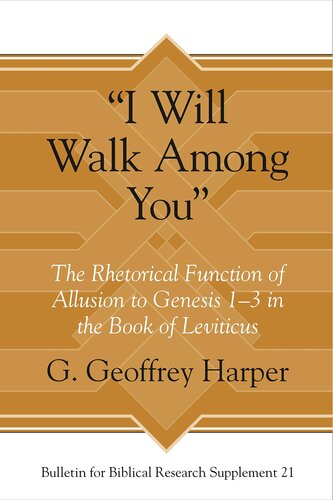

Most ebook files are in PDF format, so you can easily read them using various software such as Foxit Reader or directly on the Google Chrome browser.
Some ebook files are released by publishers in other formats such as .awz, .mobi, .epub, .fb2, etc. You may need to install specific software to read these formats on mobile/PC, such as Calibre.
Please read the tutorial at this link: https://ebookbell.com/faq
We offer FREE conversion to the popular formats you request; however, this may take some time. Therefore, right after payment, please email us, and we will try to provide the service as quickly as possible.
For some exceptional file formats or broken links (if any), please refrain from opening any disputes. Instead, email us first, and we will try to assist within a maximum of 6 hours.
EbookBell Team

4.1
20 reviewsThe well-known parallels between Genesis and Leviticus invite further reflection, particularly in regard to the rhetorical and theological purpose of their lexical, syntactical, and conceptual correspondences. This volume investigates the possibility that the final-form text of Leviticus is an indirect reference to Genesis 1–3 and examines the rhetorical significance of such an allusion.
The face of Pentateuch scholarship has shifted dramatically in the last forty years, resulting in the questioning of many received truths and the employment of a host of new, renewed, and often competing methodologies by biblical scholars. This study sits at the intersection of these recent interpretive trends. G. Geoffrey Harper uses insights from the fields of intertextuality, rhetorical criticism, and speech act theory to create a methodological framework, which he applies to three Leviticus pericopes. Chapters 11, 16, and 26 are examined in turn, and for each the assessment of potential parallels at lexical, syntactical, and conceptual levels reveals a complex web of interconnected allusion to the creation and Eden narratives of Genesis 1 and 2–3. Moreover, Harper probes the theological and rhetorical import of these intertextual connections and explores how Leviticus ought to be understood in its Pentateuchal context.
This comprehensive study of the connections between these two sections of the Hebrew Bible sheds light on both the literary artistry of these ancient texts and the persuasive purposes that lie behind their composition.